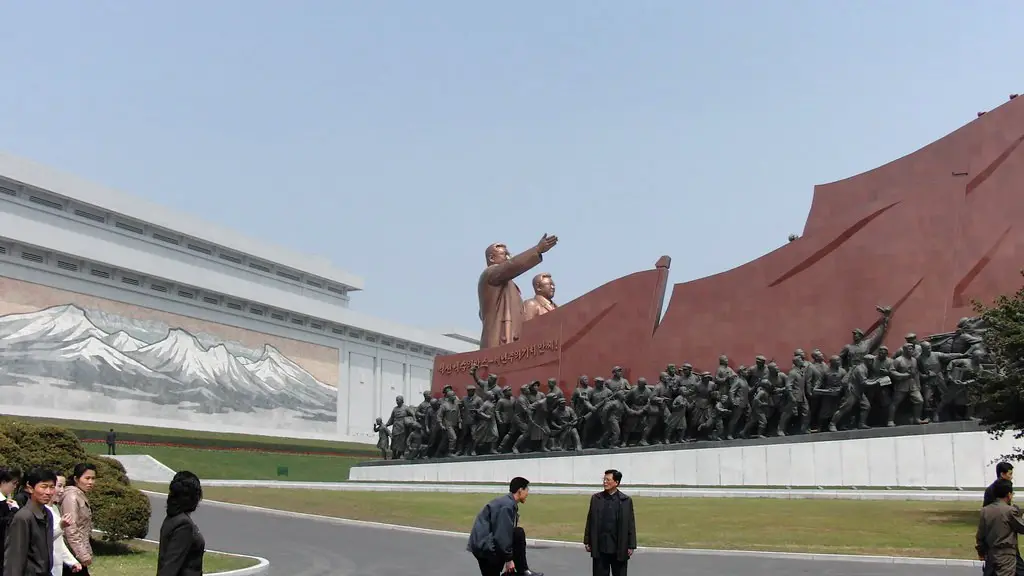Background Information
North Korea is a country located in East Asia and is officially named the Democratic People’s Republic of Korea (DPRK). It is commonly known as the Hermit Kingdom due to the fact that the country’s isolated regime has been in place since the division of Korea in 1945. North Korea is a highly authoritarian state with a system of government that is built on a cult of personality, military-first politics and a strong emphasis on nationalism. The country is led by its Supreme Leader, Kim Jong-un, and its policies are based upon the teachings of the nation’s founder, Kim il-Sung. It is one of the most heavily sanctioned states in the world, with extensive economic, political and military restrictions in place.
current Issues
Right now, North Korea is currently facing a number of issues. The nation has been isolated from the world for decades and is in the midst of an economic crisis. It is not a member of any international organizations, is heavily sanctioned by the United Nations, and is largely cut off from the global economy. The country remains underdeveloped compared to most other states in the region, with an estimated 40 percent of the population living in poverty. In addition, there are widespread human rights abuses, including the use of forced labor and systemic repression of its people.
The nation is also facing a serious military threat due to its nuclear weapons program and bellicose rhetoric towards the United States. North Korea has conducted a number of nuclear tests and is believed to possess a number of ballistic missiles that could be capable of reaching the U.S. mainland. This has led to an international response in the form of widespread economic sanctions, as well as diplomatic efforts aimed at de-escalation.
Perspectives From Experts
According to some experts, North Korea is on the brink of collapse. They argue that the nation is unable to sustain its current level of isolation due to the intense economic pressure and harsh international sanctions. This is compounded by the nation’s economic crisis, which has left the people facing widespread poverty and food insecurity. As a result, the country is seen as vulnerable to collapse if the current situation is not resolved.
However, others argue that the nation is resilient and capable of surviving its current challenges. They point to the nation’s remarkable survival of several cycles of international condemnation, economic sanctions, and military threats throughout its six-decade history. They also argue that the Kim Jong-un regime is determined to remain in power and is likely to resist any form of external intervention or collapse.
Own Insights and Analysis
At this moment in time, it is difficult to predict what the future holds for North Korea. Despite the numerous challenges that the nation is facing, it is highly unlikely that Kim Jong-un will be removed from power due to the cult of personality that surrounds him. However, it is clear that the nation is facing a number of difficult issues that cannot be ignored. The current situation is incredibly volatile, with the potential for conflict with the United States and other powerful nations. Therefore, it is essential that the international community take steps to de-escalate tensions in order to give North Korea the opportunity to find a peaceful resolution to its problems.
International Relations
North Korea’s relations with the rest of the world have been deeply strained for decades, largely due to its nuclear weapons program and belligerent rhetoric towards the United States. The most recent chapter of this ongoing saga began in 2017, when the government claimed to have successfully tested a powerful nuclear warhead. This immediately drew severe condemnation from the United Nations, with a number of economic sanctions being imposed against the nation.
In addition, the United States has consistently rejected any attempts at dialogue with the government, instead opting for a “maximum pressure” policy against the country. This has included a number of punitive measures such as travel bans, asset freezes and cyber attacks. However, in recent years, there has been a notable shift in policy, with the United States and other international bodies engaging in diplomatic negotiations with the nation.
Nuclear Program
North Korea has been developing nuclear weapons since the 1990s, in defiance of international law and condemnation from the international community. Despite this, the nation has been successful in producing a number of warheads, as well as ballistic missiles capable of reaching the United States mainland. This has led to great concern amongst world leaders, especially in the United States, as it has the potential to spark a major nuclear conflict.
In response to this, the United States has sought to reach a diplomatic solution and has engaged in numerous talks with the North Korean government. However, despite some positive developments, progress has been limited and a comprehensive agreement is yet to be reached. The United States and other countries have also imposed further economic sanctions in an effort to pressure North Korea into abandoning its nuclear program.
Propaganda And Censorship
North Korea is infamous for its control of information, with the state propagating a particular image of itself that is at odds with the reality. The nation’s totalitarian regime tightly controls the media, censoring information and maintaining a heavy-handed grip on its citizens. All media outlets are state-owned, and all journalists must adhere to strict guidelines or face severe consequences.
The state also maintains a tight grip on internet access, with virtually no access to the outside world except for a select few. Social media and foreign news outlets are heavily censored and possession of foreign media can lead to serious consequences. In addition, the state has cracked down on illegal border crossings, leading to a number of recorded deaths of those trying to escape.
Human Rights Violations
Despite a number of international condemnations, the North Korean government continues to engage in a number of serious human rights violations. This includes the use of systematic torture and degrading treatment of prisoners, enforced disappearances, and the use of forced labor in prison camps. In addition, the nation has refused to provide any access to international organizations such as the United Nations or the International Committee of the Red Cross.
In response to these issues, the international community has condemned North Korea for its lack of respect for human rights and has imposed economic sanctions as a means of pressuring the government into compliance. The United Nations has also passed a number of resolutions calling for the immediate release and protection of all political prisoners, as well as for the implementation of international human rights standards in the nation.
Regional Relations
North Korea’s relations with its neighbors have also been strained for decades, largely due to its nuclear weapons program, belligerent rhetoric and aggressive posturing. The nation has engaged in numerous military conflicts with South Korea, only recently engaging in formal diplomatic talks. Despite this, North Korea has also established a number of closer relations with the region.
The nation has maintained good relations with China, with whom it shares a long and complex history. In addition, it has made steps to normalize relations with Russia, with the two states engaging in frequent talks and holding a number of joint military exercises. North Korea has also formed closer ties with other nations in the region such as Vietnam and Mongolia, as well as engaging in a prolonged peace process with Japan.
Economic Situation
The economic situation in North Korea is dire, with the nation suffering from a cycle of poverty and austerity that has persisted for decades. The nation is highly dependent on foreign aid, with the international community providing much of its food and energy needs. In addition, the government has consistently refused to implement economic reforms, leading to a near-stagnant economy with a systemic lack of essential goods and services.
In response to this, the United Nations has imposed a number of economic sanctions in an effort to pressure the nation into compliance. This has had devastating impacts on the economy, leading to food shortages and a rise in poverty. The United States has also taken a hardline stance against the nation, engaging in a “maximum pressure” campaign designed to weaken the nation’s already fragile economy.


